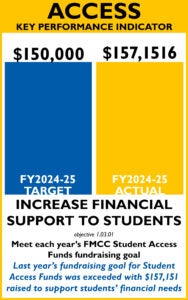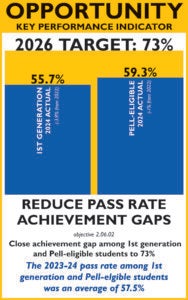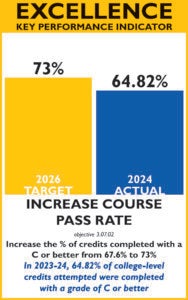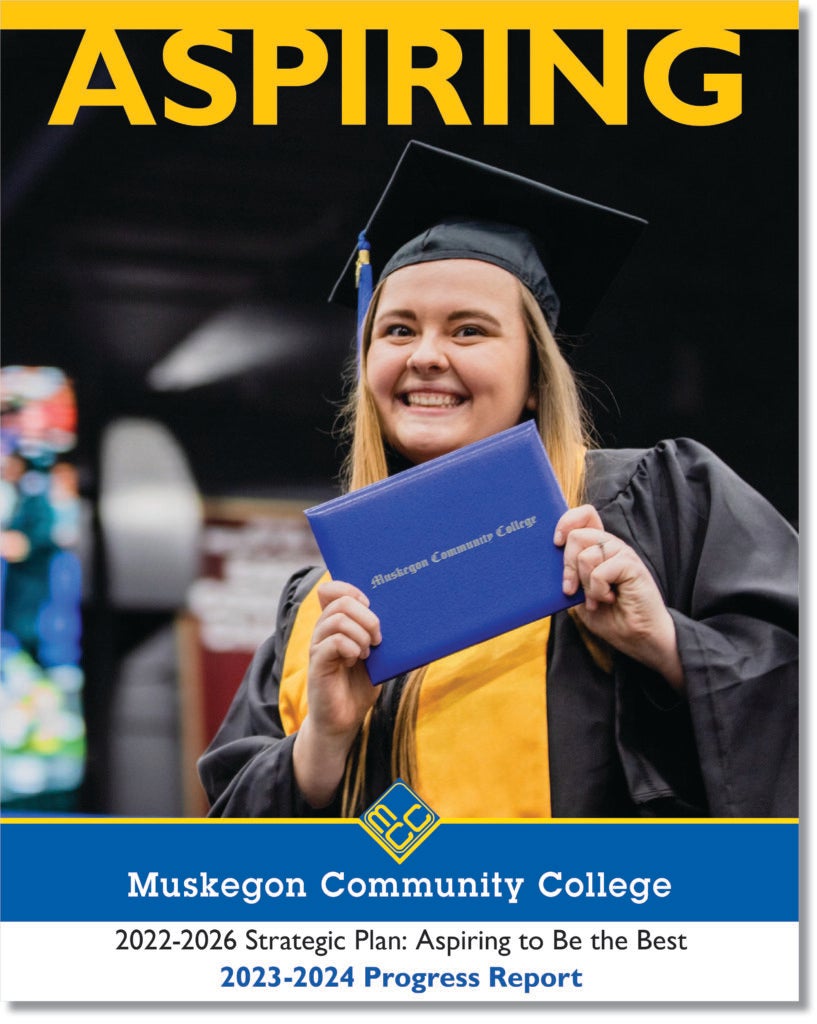Strategic Initiatives
Office of Strategic Initiatives
The Office of Strategic Initiatives manages strategic planning, implementation activities, and other strategic initiatives. This includes coordinating attainment of institutional goals, completing related research projects, producing reports, and keeping stakeholders informed and engaged. Strategic planning and implementation efforts are guided by the MCC Integrated Planning Charter.
Please direct questions or comments to:
Tina Dee
Director of Strategic Initiatives
Room 2109T
(231) 777-0660
tina.dee@muskegoncc.edu
Our Mission Statement:
Muskegon Community College, dedicated to excellence, prepares students, builds communities, and improves lives.
Our Vision:
An educated, thriving community.
Our Guiding Values:
Learning
Integrity
Excellence
Collaboration
Kindness
Muskegon Community College is guided by our mission, vision, and values. We aim for all three of these statements to work together in harmony, without overlaps or gaps.
Our mission statement defines our purpose; our current mission statement was adopted in January 2017. It was edited slightly in March 2025 in response to Executive Order 14173.
Our vision statement describes our aspirations and explains our desired end-state and what we hope to accomplish; our current vision statement was endorsed by the Board of Trustees in August 2019. It was edited slightly in March 2025 in response to Executive Order 14173.
Our guiding values describe our behaviors and the manner in which we support our mission and achieve our vision; our current values were endorsed by the Board of Trustees in January 2021.
The MCC Integrated Planning Steering Committee manages the process of reviewing and updating our mission, vision, and values. They are reviewed every five years in conjunction with our strategic planning process.
The MCC 2022-2026 Strategic Plan: Aspiring to Be the Best
The strategic plan priorities and goals were developed with the input of 46 organizations and over 2,000 students, employees, and community members participating in planning committees, forums, surveys, and focus groups. The 2022-2026 Strategic Plan: Aspiring to Be the Best was launched in early 2022 and concludes on June 30, 2026. The primary objective of the plan is to position Muskegon Community College as the best community college in the nation based on student success data. Progress reports are published here each quarter.
Strategic Plan Key Performance Indicators
 |  |  |
Strategic Plan Priorities and Goals
ACCESS goals
1. Raise awareness of MCC
2. Meet enrollment goals while expanding opportunities for all students
3. Expand community engagement
OPPORTUNITY goals
4. Cultivate a culture of understanding and respect
5. Enhance each student’s experience
6. Improve outcomes for all students
EXCELLENCE goals
7. Improve institutional effectiveness
8. Provide exceptional environments for effective teaching and learning
9. Increase transfer and career success of graduates
Reports: Review progress made on Goals and measurable objectives

ASPIRING, our most recent Annual Progress Report, outlines our progress towards meeting our goals and measurable objectives. In addition, we publish progress reports each quarter:
- Summer 2025 Quarterly Progress Report
- Spring 2025 Quarterly Progress Report
- Winter 2025 Quarterly Progress Report
- Fall 2024 Quarterly Progress Report
- Summer 2024 Quarterly Progress Report
- Spring 2024 Quarterly Progress Report
Unless otherwise noted, baseline/starting metrics are as of the 1/1/22 launch and the due date to attain target metrics is when the plan concludes on 6/30/2026.
Note: The strategic plan was updated February 28, 2025 to align with Executive Order 14173 and the Department of Education’s “Dear Colleague” letter. As a result of these updates, one goal and two objectives were removed, a priority was renamed, and several goals and objectives were reworded and renumbered. Reports produced and activities that transpired before that date reflect the previous version of the strategic plan.
MCC Integrated Planning Steering Committee
- Dr. John Selmon, President (Chair)
- Tina Dee, Director of Strategic Initiatives (Assistant Chair)
- Kristine Anderson, Chief Human Resources Officer
- Dr. Ed Breitenbach, Dean of Assessment and Instruction
- Dr. Tucker Brown, Provost (pending)
- Nicholas Budimir, Faculty Association representative
- Ruben Cortez, Custodial/Maintenance Unit Association representative
- Dr. Patti D’Avignon, Dean of Student Services
- Beth Dick, Chief Financial Officer
- Ken James, Chief Compliance & Title IX Officer
- Chris Nowak, Educational Support Staff Association representative
- Susan Samaniego, Chief Advancement Officer
- Kristin Tank, Chief Marketing & Communications Officer
- Dr. Steven Wilson, Chief Information Officer (Ellucian)
Integrated Planning Consultant: Dr. Nicholas Santilli, Senior Director for Learning Strategy, The Society for College and University Planning (SCUP)

MCC integrated planning steering Committee: Back row l-r: Dr. Ed Breitenbach, Dean of Assessment and Instruction; Dr. Steven Wilson, Chief Information Officer (Ellucian); Ken James, Chief Compliance & Title IX Officer; Dr. John Selmon, President (Chair). Front row: Beth Dick, Chief Financial Officer; Kristin Tank, Chief Marketing & Communications Officer; Dr. Patti D’Avignon, Dean of Student Services; Tina Dee, Director of Strategic Initiatives (Assistant Chair); Chris Nowak, Educational Support Staff Association representative. Not shown: Kristine Anderson, Chief Human Resources Officer; Nicholas Budimir, Faculty Association representative; Ruben Cortez, Custodial/Maintenance Unit Association representative; Susan Samaniego, Chief Advancement Officer.
MCC’s Achieving the Dream Team
MCC is proud to be an Achieving the Dream Leader College. Achieving the Dream is a national nonprofit dedicated to helping community college students succeed. MCC’s Achieving the Dream (ATD) Team is a vital partner in attaining the College’s strategic plan goals. The ATD Team works to: improve the student experience; increase persistence, retention, and completion rates; make data accessible, understandable and usable; reduce achievement gaps; and remove barriers to access and success. The team is led by Dr. Patti D’Avignon, Dean of Student Services, and Jon Meeuwenberg, College Success Center Faculty. Team members include: Chief Compliance & Title IX Officer (Ken James), Chief Human Resources Officer (Kristine Anderson), Director of Student Success (Dr. Steve Sanocki), Institutional Effectiveness (Erin Strauts), Faculty (Irene Church, Evin Rodkey, Megan Lockard), Counselor (Lisa Ribbe), Workforce Development (Stephanie Briggs), Communications (Jon Mills), Student Success Staff Member (Emily Merten), and Student Representative (TBD).
Goal Team Leaders:
- Access Goal Team Leads: Stephanie Briggs, Associate Dean of Workforce & Talent Development; Sarah Luker, Director of Admissions; and Kristin Tank, Chief Marketing & Communications Officer
- Opportunity Goal Team Leads: Ken James, Chief Compliance & Title IX Officer, and Jason Cooper, Dean of College Services & Athletics
- Excellence Goal Team Leads: Dr. Ed Breitenbach, Dean of Assessment and Instruction; Dr. Patti D’Avignon, Dean of Student Services; and George Sharp, Counseling Department Chair
How the Strategic Plan was Developed
Throughout 2021, Muskegon Community College engaged campus and community members in a process to develop the Muskegon Community College 2022-2026 strategic plan. Under the direction of the MCC Integrated Planning Steering Committee, 150 students, community stakeholders, and employees served on six committees that met July through October 2021 to identify priorities and goals for the new plan. In addition, all community members, students, employees, and other stakeholders were invited to provide input via town hall meetings, forums, and surveys. Overall, 46 organizations and 2,354 people participated in the process.
The collaborations produced a new 54-month strategic plan that builds on student success accomplishments and aims to position Muskegon Community College as the best community college in the nation. The comprehensive and inclusive planning process led to three priorities and ten goals, which were endorsed by the MCC Board of Trustees in March 2022. Stakeholder input continues to be a vital part of the process; everyone is welcome to provide feedback on the strategic plan at any time during the 4.5-year implementation period at strategy@muskegoncc.edu.
MCC’s Integrated Planning Process
The 54-month plan commenced in spring 2022 and concludes June 30, 2026. Our aim is to increase enrollment among under-represented groups and meet the criteria for the top student success awards from the leading student success organizations, the Achieving the Dream Leah Meyer Austin Award, Achieving the Dream Leader College of Distinction, and the Aspen Prize for Community College Excellence. These prestigious awards are based on student success outcomes, with a focus on equity, access, retention, completion, graduation rates, and post-graduate success, including employment and transfer outcomes.
Integrated planning is a sustainable approach to planning that builds relationships (internal and external), aligns the organization (horizontally across departments, vertically from operations to mission), and emphasizes preparedness for change (ongoing engagement and feedback). Visit the Society for College and University Planning’s website to learn more.
The planning process integrated Appreciative Inquiry, which is a strengths-based approach. Collaborative discussions in 2021 with the 150 students, community members, and employees serving on five committees resulted in the following conclusions:
What we do well:
- Provide exceptional value for a high-quality education
- Offer outstanding support to students
- Provide a wide array of community services and events
What we value:
- The success of our students
- Providing a welcoming environment
- Community collaborations
- Teaching and learning
- Talent, expertise, commitment, and dedication of faculty and staff
What we hope for the future:
- Increase access and enrollment
- Improve diversity, equity, and inclusion
- Expand collaborations
- Provide an exceptional environment for teaching and learning
Additional information about the planning process is outlined in the MCC Integrated Planning Charter. Please direct questions or comments to:
Tina Dee
Director of Strategic Initiatives
Room 2109T
(231) 777-0660
tina.dee@muskegoncc.edu


